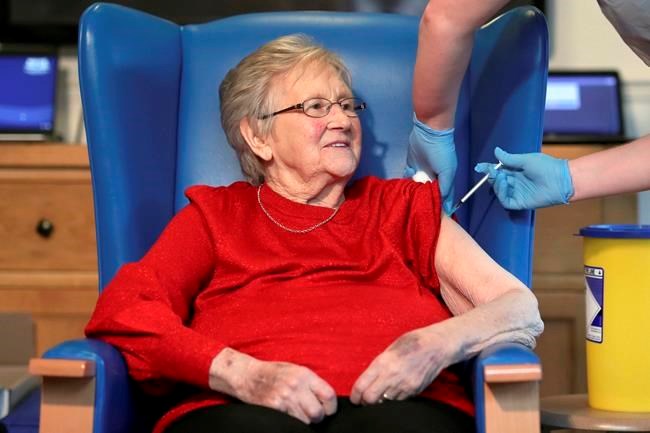OTTAWA — Canada's foreign-aid budget swelled noticeably Monday with International Development Minister Karina Gould's announcement of $485 million in new money toward the global effort to provide COVID-19 medicines to poor countries.
The new funds are going towards the Access to COVID-19 Tools, or "ACT" Accelerator, which was created in April by the World Health Organization, the French government, the European Commission and the Bill and Melinda Gates Foundation.
Gould and Procurement Minister Anita Anand also left open the possibility Monday that if Canada has any surpluses of vaccines it has already pre-bought, they could be shared with poorer countries.
Gould said that with only one vaccine currently approved by Health Canada, it's too early to make that determination.
"We are part of a global community, and our health at home depends on the health of everyone everywhere. Canadians understand that no one is safe from COVID-19 unless everyone is safe, and today's new commitments will help to make that possible," said Gould.
Anand said Gould's announcement "is a promise to help other countries when we will be able to do so."
Canada has secured guarantees for 214 million doses of vaccine, if all seven vaccine candidates procured are approved. It has also negotiated the potential to get another 200 million doses.
Last week, Oxfam Canada released a report that said Canada topped the list of rich countries that have pre-bought COVID-19 vaccines, having secured enough to cover its population five times over. Oxfam urged Canadians to show more compassion to poorer people.
On Monday, Oxfam Canada's interim executive director Kate Higgins said the organization was "pleased to see Canada take additional and ongoing leadership to ensure that everyone on the planet has access to the COVID-19 vaccine."
Higgins also said that "the only way we will get vaccines for everyone is for pharmaceutical corporations to openly share their technology and intellectual property. We hope Canada will continue to push for this as well."
The advocacy group One Campaign, which has criticized Canada's relatively low foreign aid spending in the past, offered effusive praise.
Stuart Hickox, the Canada director for One Campaign, said the announcement marked a "great day" for Canada.
"As COVID vaccinations begin here, Canada is also showing global leadership in the fight to end the pandemic everywhere. Today's investment is Canadian compassion in action. It's also smart," he said, saying that every $1 spent on aid would generate a $5.60 return to Canada's economy.
Michael Messenger, president of World Vision Canada, said where a child is born shouldn't have an impact on whether they get access to a life-saving vaccine.
"It’s a human right," he said.
"This commitment will help to make sure that girls and boys living in the most fragile parts of the world benefit from the great work of some of the smartest people and latest technology. This is how we will end this pandemic together."
The ACT Accelerator is part of a global effort to ensure low- and middle-income countries have equitable access to medical treatments during the pandemic.
It supports organizations, health professionals and businesses in their efforts to develop vaccines, as well as drug therapies and diagnostic tools to battle the pandemic.
Monday's announcement includes $255 million in additional support for the ACT Accelerator through "focused investments" in the World Health Organization, the Pan-American Health Organization, the Coalition for Epidemic Preparedness Innovations (CEPI) and Gavi, the Vaccine Alliance, which distributes vaccines in poor countries.
Canada has now committed more than $865 million to the ACT-Accelerator and has also pledged $220 million to its partner initiative, the COVAX Facility, to help buy vaccine doses for low- and middle-income countries.
A spokesman for Gould said that based on the government's latest annual spending figures for the fiscal year of 2018-2019, Canada delivered $5.9 billion in official development assistance.
This report by The Canadian Press was first published Dec. 14, 2020.
Mike Blanchfield, The Canadian Press
